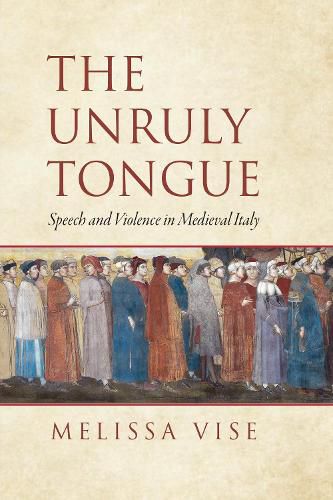Readings Newsletter
Become a Readings Member to make your shopping experience even easier.
Sign in or sign up for free!
You’re not far away from qualifying for FREE standard shipping within Australia
You’ve qualified for FREE standard shipping within Australia
The cart is loading…






A cultural history of speech in medieval Italy
The Unruly Tongue, a cultural history of speech in medieval Italy, offers a new account of how the power of words changed in Western thought. Despite the association of freedom of speech with the political revolutions of the eighteenth century that ushered in the era of modern democracies, historian Melissa Vise locates the history of the repression of speech not in Europe's monarchies but rather in Italy's republics. Exploring the cultural process through which science and medicine, politics, law, literature, and theology together informed a new political ethics of speech, Vise uncovers the formation of a moral code where the regulation of the tongue became an integral component of republican values in medieval Europe.
The medieval citizens of Italy's republics understood themselves to be wholly subject to the power of words not because they lived in an age of persecution or doctrinal rigidity, but because words had furnished the grounds for their political freedom. Speech-making was the means for speaking the republic itself into existence against the opposition of aristocracy, empire, and papacy. But because words had power, they could also be deployed as weapons. Speech contained the potential for violence and presented a threat to political and social order, and thus needed to be controlled. Vise shows how the laws that governed and curtailed speech in medieval Italy represented broader cultural understandings of human susceptibility to speech. Tracing anthropologies of speech from religious to political discourse, from civic courts to ecclesiastical courts, from medical texts to the works of Dante and Boccaccio, The Unruly Tongue demonstrates that the thirteenth century marked a major shift in how people perceived the power, and the threat, of speech: a change in thinking about "what words do."
$9.00 standard shipping within Australia
FREE standard shipping within Australia for orders over $100.00
Express & International shipping calculated at checkout
A cultural history of speech in medieval Italy
The Unruly Tongue, a cultural history of speech in medieval Italy, offers a new account of how the power of words changed in Western thought. Despite the association of freedom of speech with the political revolutions of the eighteenth century that ushered in the era of modern democracies, historian Melissa Vise locates the history of the repression of speech not in Europe's monarchies but rather in Italy's republics. Exploring the cultural process through which science and medicine, politics, law, literature, and theology together informed a new political ethics of speech, Vise uncovers the formation of a moral code where the regulation of the tongue became an integral component of republican values in medieval Europe.
The medieval citizens of Italy's republics understood themselves to be wholly subject to the power of words not because they lived in an age of persecution or doctrinal rigidity, but because words had furnished the grounds for their political freedom. Speech-making was the means for speaking the republic itself into existence against the opposition of aristocracy, empire, and papacy. But because words had power, they could also be deployed as weapons. Speech contained the potential for violence and presented a threat to political and social order, and thus needed to be controlled. Vise shows how the laws that governed and curtailed speech in medieval Italy represented broader cultural understandings of human susceptibility to speech. Tracing anthropologies of speech from religious to political discourse, from civic courts to ecclesiastical courts, from medical texts to the works of Dante and Boccaccio, The Unruly Tongue demonstrates that the thirteenth century marked a major shift in how people perceived the power, and the threat, of speech: a change in thinking about "what words do."